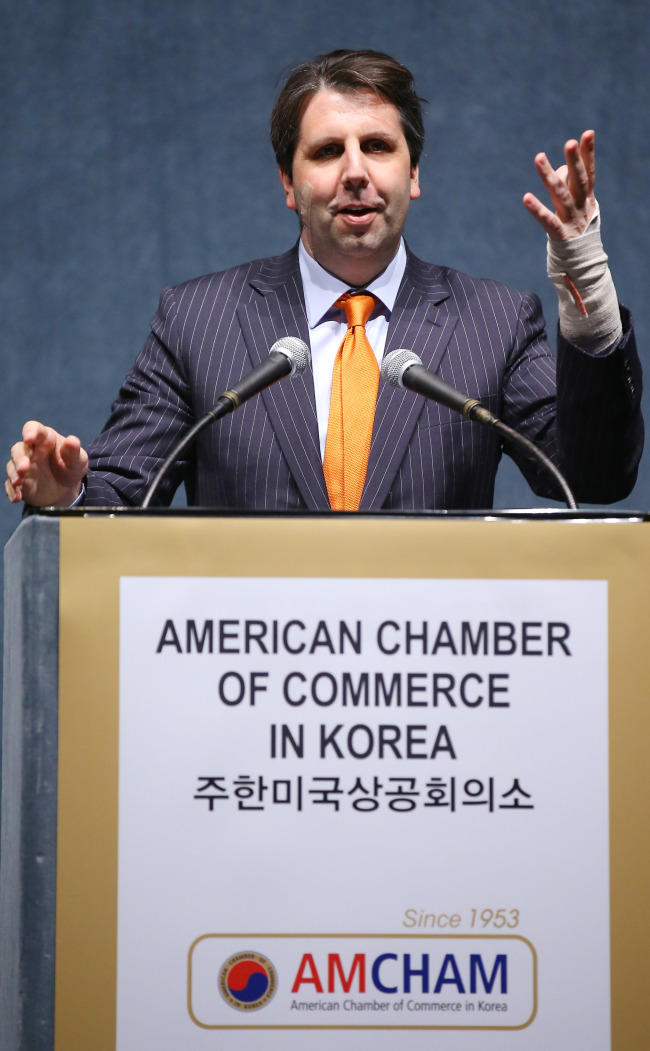U.S. welcomes improved Seoul-Beijing ties: Lippert
By Sohn Ji-youngPublished : April 30, 2015 - 19:25
U.S. Ambassador Mark Lippert has dismissed concerns that South Korea’s improved ties with China could alter the U.S.-Korea alliance, welcoming Seoul and Beijing’s closer economic cooperation.
“The U.S. welcomes a better relationship between Beijing and Seoul,” Lippert said at the American Chamber of Commerce in Korea’s general membership meeting in Seoul on Thursday.
South Korea has recently expanded ties with China by signing a bilateral free trade agreement and joining the China-led Asia Infrastructure Investment Bank.
“We live in the 21st century. This isn’t spheres of influence of competing 19th-century politics,” Lippert said, adding that the U.S. welcomes “more free trade, more cooperation and more collaboration because in the end, (free trade) is a good thing that helps all boats float and rise.”
“The U.S. welcomes a better relationship between Beijing and Seoul,” Lippert said at the American Chamber of Commerce in Korea’s general membership meeting in Seoul on Thursday.
South Korea has recently expanded ties with China by signing a bilateral free trade agreement and joining the China-led Asia Infrastructure Investment Bank.
“We live in the 21st century. This isn’t spheres of influence of competing 19th-century politics,” Lippert said, adding that the U.S. welcomes “more free trade, more cooperation and more collaboration because in the end, (free trade) is a good thing that helps all boats float and rise.”

Lippert emphasized that neither Korea’s entry into the AIIB nor the recently signed Korea-China FTA would shake the Korea-U.S. alliance, which he believes is “unbelievably strong and moving in a direction of more strength.”
In response to Korea’s plans to formally join the U.S.-led Trans-Pacific Partnership, which would establish one of the largest free trade zones in the world, Lippert said the two countries may need to first work on fully implementing the terms of the Korea-U.S. FTA concluded in 2012.
“(Korea would need to) ensure that the KORUS FTA is fully implemented. It is not a prerequisite. We don’t do that with trade deals. But what we want is success. The more successful the (KORUS FTA) is, the easier it gets (for the TPP to be successful),” Lippert said.
Lippert also praised the two countries’ strides recently made on a number of longstanding issues. They included the signing of a new bilateral nuclear cooperation pact known as the 123 Agreement and progress in implementing a conditions-based transition of wartime operational control.
The U.S. ambassador called for the two allies to use the “good relationship that the two countries have built over the (last) 60 years” to push for global cooperation on new areas such as cyberspace, energy and the environment as well as health.
By Sohn Ji-young (jys@heraldcorp.com)










![[Weekender] How DDP emerged as an icon of Seoul](http://res.heraldm.com/phpwas/restmb_idxmake.php?idx=644&simg=/content/image/2024/04/25/20240425050915_0.jpg&u=)

![[Herald Interview] Guggenheim Museum makes a push for technology-based art with LG](http://res.heraldm.com/phpwas/restmb_idxmake.php?idx=644&simg=/content/image/2024/04/26/20240426050608_0.jpg&u=20240428114717)





![[Herald Interview] Mistakes turn into blessings in street performance, director says](http://res.heraldm.com/phpwas/restmb_idxmake.php?idx=652&simg=/content/image/2024/04/28/20240428050150_0.jpg&u=)
